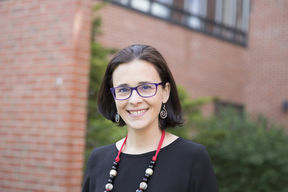Passion and patience are the most important qualities for a researcher

What kind of research do you do, and why?
My aim is to play a crucial role in developing next-generation electronics. I do research on organic electronics which use organic molecules instead of conventional materials like, silicon. Organic materials enable a novel class of devices which, along with traditional properties, can also be flexible and conformable. This would enable such things as medical devices that can adapt to body movements, clothing with integratable sensors or foldable mobile telephone displays. There are still a lot of open questions in the field which I plan to address through my work.
My research interest in organic electronics started back in 2012 when I joined the R&D division of a small Italian spin-off company who were working on organic light emitting devices. Working across the fundamental research and R&D environment has provided me with a broader perspective on how to bring a laboratory object to a close-to-market application. Here at Aalto, my goal is to combine those aspects: I will pursue fundamental research while guiding the results towards practical applications.
How did you become a researcher?
While in high school, I was caught between wanting to do science or foreign literature as I wanted to learn languages and see the world. Back then, my physics teacher told me that with a scientific degree, I could go anywhere I want later on in my career. I chose to study physics, and it indeed led me to many interesting places.
I pursued doctoral studies in the United States, where I worked on carbon nanomaterials. During my PhD studies I realised science was something I wanted to do in my life. It was such a good experience, and I had an awesome senior supervisor who showed me the beauty of this work. I quickly understood how much fun and how rewarding the work of a researcher can be, even though it can be full of failures and uncertainty along the way. Thanks to this experience, I am still here today and enjoying my work more than fifteen years later.
What are the highlights of your career?
I believe that it has been incredibly valuable to have had the chance to work in several places and have collaborated with a lot of colleagues from such different backgrounds. Having worked in Italy, the United States and France, and conducted research in both the academic and R&D environments has surely provided me with a unique perspective on research work, and a very open-attitude.
As a researcher, one of my greatest achievements is the article which I wrote independently in 2015, which was published in the well-reputed Progress in Material Science journal. This work gathers literature as well as most of my scientific experience since 2005 on hybrid architectures based on metal filled carbon nanotubes.
From a more personal point of view, I was nominated Woman Innovator of the Year in 2016 by the Italian Association of Women Inventors and Innovators (ITWIIN), and I later received an honourable mention from the European Women Inventors & Innovators Network (EUWIIN). These recognitions, related to the development of novel organic materials and architectures for applications in flexible displays, have been significant to me both as a researcher and as a woman working in science.
What is the most important quality for a researcher?
The ability to examine things from several and different points of view. Science involves investigating the unknown and to go beyond boundaries, so a scientist needs to be capable of thinking outside the box. Cooperating and discussing things with people from different backgrounds helps to expand our thinking. A researcher must also have passion and patience as this work, generally speaking, does not bring wealth and fame, and failure is often part of our path. But if the passion is there, it makes everything worth it!
What do you expect from the future?
In my work, I have learned that plans constantly change, so I have stopped planning for the long term! Currently, I am working towards setting up the Organic Electronics lab while initiating my research group and generally getting to know my new research community. I hope that someday, the technology that we plan to develop will improve and make people's lives easier.
Read more news

Significant donation to boost pavement engineering research and education
Companies and associations in the field have donated €400,000 to the School of Engineering.
‘Mesoscale’ swimmers could pave way for drug delivery robots inside the body
Researchers have discovered how tiny organisms break the laws of physics to swim faster — such secrets of mesoscale physics and fluid dynamics can offer entirely new pathways for engineering and medicine.
Design strengthens industrial competitiveness – human-centered factory work at the core
Factory work is undergoing a transformation: new technologies and artificial intelligence are changing the content and roles of work. Aalto University’s Department of Design is studying this change from a human-centered perspective in the HiFive project.






